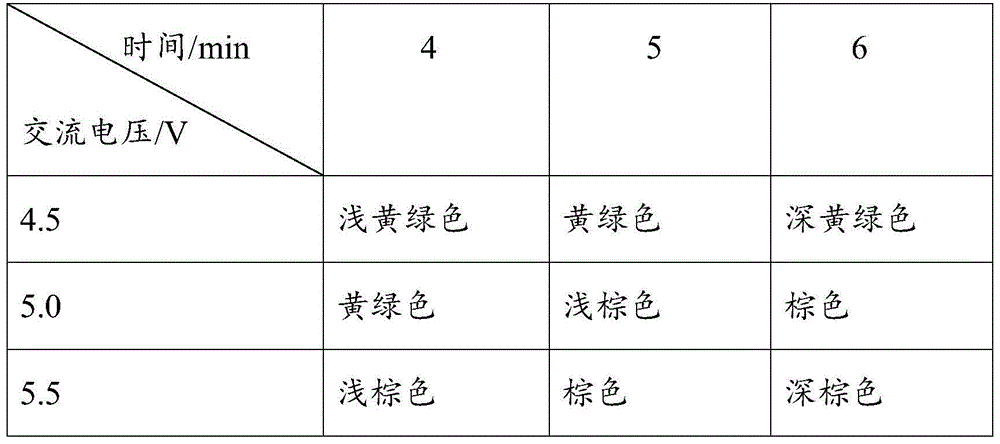Coloring method adopting aluminium alloy alternate current electrolysis for precipitating silver and copper
A technology of electrolytic deposition and electrolytic coloring, applied in electrolytic coatings, surface reaction electrolytic coatings, coatings, etc., can solve the problems of poor stability of coloring liquids, achieve long-lasting antibacterial and bactericidal effects, convenient operation, and low cost of coloring treatment Effect
- Summary
- Abstract
- Description
- Claims
- Application Information
AI Technical Summary
Problems solved by technology
Method used
Image
Examples
Embodiment 1
[0037] After pretreatment such as degreasing, oxide film removal, ash removal, and water washing, the aluminum alloy sheet contains 5g / LAl 2 (SO 4 ) 3 18H 2 O and 170g / LH 2 SO 4 Concentrated solution, electrolysis at 19-21 DEG C and 14V DC voltage for 30 minutes, washing and immersing to remove the surface electrolyte, to obtain an aluminum alloy sheet with a porous oxide film with a thickness of about 15-20 microns.
[0038] with H 2 SO 4 17g / L, AgNO 3 5g / L, CuSO 4 ·5H 2 O 1.5g / L, MgSO 4 ·7H 2 O 20g / L, glycine 3.2g / L to prepare coloring electrolyte, carry out AC electrolytic coloring on the aluminum alloy sheet at a temperature of 25°C, then wash and soak in water to remove the surface electrolyte, and finally seal with hot water. Table 1 below shows the colors attached to AC electrolytic aluminum alloys at different times and AC voltages.
[0039] Table 1 When CuSO 4 ·5H 2 Influence of AC electrolysis voltage and time on the coloring of aluminum alloy at O 1....
Embodiment 2
[0042] After pretreatment such as degreasing, oxide film removal, ash removal, and water washing, the aluminum alloy sheet contains 5g / LAl 2 (SO 4 ) 3 18H 2 O and 170gLH 2 SO 4 Concentrated solution, electrolysis at 19-21 DEG C and 14V DC voltage for 30 minutes, washing and immersing to remove the surface electrolyte, to obtain an aluminum alloy sheet with a porous oxide film with a thickness of about 15-20 microns.
[0043] with H 2 SO 4 17g / L, AgNO 3 5g / L, CuSO 4 ·5H 2 O 2.0g / L, MgSO 4 ·7H 2 O 20g / L, glycine 3.2g / L to prepare colored electrolyte. Perform AC electrolytic coloring on the aluminum alloy sheet at a temperature of 25°C, then wash and soak to remove the surface electrolyte, and finally seal with hot water. Table 2 below shows the colors attached to AC electrolytic aluminum alloys at different times and voltages.
[0044] Table 2 When CuSO 4 ·5H 2 Influence of AC electrolysis voltage and time on the coloring of aluminum alloy at O 2.0g / L
[0045] ...
Embodiment 3
[0047] Degreasing, removing oxide film and other pre-treated aluminum alloy sheets containing 5g / L Al 2 (SO 4 ) 3 18H 2 O and 170gLH 2 SO 4 In a solution with a high concentration, use DC electrolysis at 19-21°C and 14V for 30 minutes, wash and soak to remove the surface electrolyte, and obtain a porous oxide film with a thickness of about 15-20 microns.
[0048] with H 2 SO 4 17g / L, AgNO 3 5g / L, CuSO 4 ·5H 2 O 2.5g / L, MgSO 4 ·7H 2 O 20g / L, glycine 3.2g / L to prepare colored electrolyte. Perform AC electrolytic coloring on the aluminum alloy sheet at a temperature of 25°C, then wash and soak to remove the surface electrolyte, and finally seal with hot water. Table 3 below shows the colors attached to AC electrolytic aluminum alloys at different times and voltages.
[0049] Table 3 When CuSO 4 ·5H 2 Influence of AC electrolysis voltage and time on the coloring of aluminum alloy at O 2.5g / L
[0050]
PUM
| Property | Measurement | Unit |
|---|---|---|
| Thickness | aaaaa | aaaaa |
Abstract
Description
Claims
Application Information
 Login to View More
Login to View More - R&D
- Intellectual Property
- Life Sciences
- Materials
- Tech Scout
- Unparalleled Data Quality
- Higher Quality Content
- 60% Fewer Hallucinations
Browse by: Latest US Patents, China's latest patents, Technical Efficacy Thesaurus, Application Domain, Technology Topic, Popular Technical Reports.
© 2025 PatSnap. All rights reserved.Legal|Privacy policy|Modern Slavery Act Transparency Statement|Sitemap|About US| Contact US: help@patsnap.com



